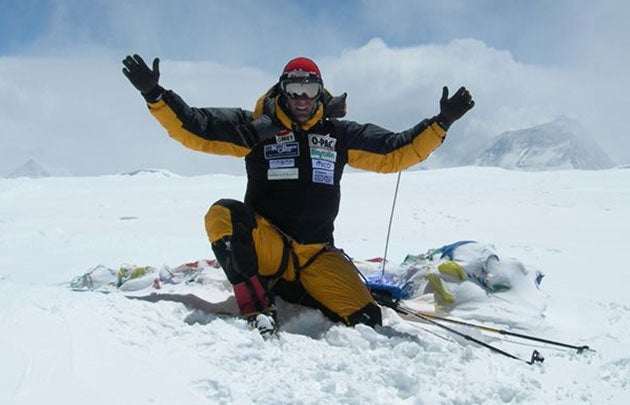Rescued Italian climber refused to be conquered by K2

Your support helps us to tell the story
From reproductive rights to climate change to Big Tech, The Independent is on the ground when the story is developing. Whether it's investigating the financials of Elon Musk's pro-Trump PAC or producing our latest documentary, 'The A Word', which shines a light on the American women fighting for reproductive rights, we know how important it is to parse out the facts from the messaging.
At such a critical moment in US history, we need reporters on the ground. Your donation allows us to keep sending journalists to speak to both sides of the story.
The Independent is trusted by Americans across the entire political spectrum. And unlike many other quality news outlets, we choose not to lock Americans out of our reporting and analysis with paywalls. We believe quality journalism should be available to everyone, paid for by those who can afford it.
Your support makes all the difference.An Italian climber who fought the twin perils of exhaustion and freezing temperatures on the world's deadliest mountain was last night rescued as he struggled alone in darkness down the slopes of K2.
While authorities said they believed 11 other climbers perished on the peak known as "Killer Mountain" over the weekend, they confirmed that a rescue team had found Marco Confortola late yesterday evening and were escorting him down the slopes. His hands appeared to be badly damaged by frostbite but otherwise he seemed to be in reasonable condition.
The Italian climber, who is 37, was met by a rescue team comprising three Pakistani specialist porters and an American climber that was making its way up the mountain to save him from spending another night alone on the slopes. Sultan Alam, a Pakistani guide, said: "Marco is being accompanied by four rescuers and most probably, he'll be brought tonight to the advance base camp at an altitude of 6,000 metres."
Earlier, Agostino Da Polenza, head of the Ev-K2-CNR mountaineering group in Italy, said Mr Confortola had spoken with him by satellite phone and stressed his determination to make it off K2 alive. He had said: "Of course, of course, I'll keep going. Imagine if I gave up now."
Mr Confortola was one of three climbers saved yesterday. Earlier, a Pakistani army helicopter had plucked two Dutch climbers from the slopes of the world's second highest mountain, located on the border between Pakistan and China.
But these were just small glimmers of comfort on a day marked by the confirmation that 11 climbers were believed to have died in the deadliest weekend in K2's history. Officials said that among the dead were three Koreans, two Nepalis, two Pakistani porters, and French, Serbian, and Norwegian climbers. They said they believed that an Irishman, Gerard McDonnell, earlier listed as missing, had also died.
It is believed that a number of the dead were killed after a ridge of ice broke off while around two dozen climbers from various expeditions were descending a notorious section of the mountain known as the Bottleneck. Amid a mass of conflicting details, it appears that some of those who survived the avalanche refused to help their colleagues and put their own survival first.
Wilco van Rooijen, the rescued leader of a Dutch team that lost at least three members, described from his hospital bed in the northern Pakistani town of Skardu how he had shouted in vain for people to work together. "They were thinking of 'my gas, my rope', whatever. Everybody was fighting for himself and I still do not understand why everybody was leaving each other," he said. "People didn't know where to go, so a lot of people were lost on the mountain on the wrong side, wrong route, and then you have a big problem and then things like that happen."
He added: "The biggest mistake we made was that we tried to make agreements. Everybody had his own responsibility and then some people did not do what they promised."
The deaths of the climbers are likely to focus attention on the planning and preparation of the expeditions as well as the conduct of the climbers. Already there are suggestions that some of the climbers showed poor judgement and so-called "summit fever" had led them to make bad decisions that had fatal results not only for themselves but for their porters.
Join our commenting forum
Join thought-provoking conversations, follow other Independent readers and see their replies
Comments